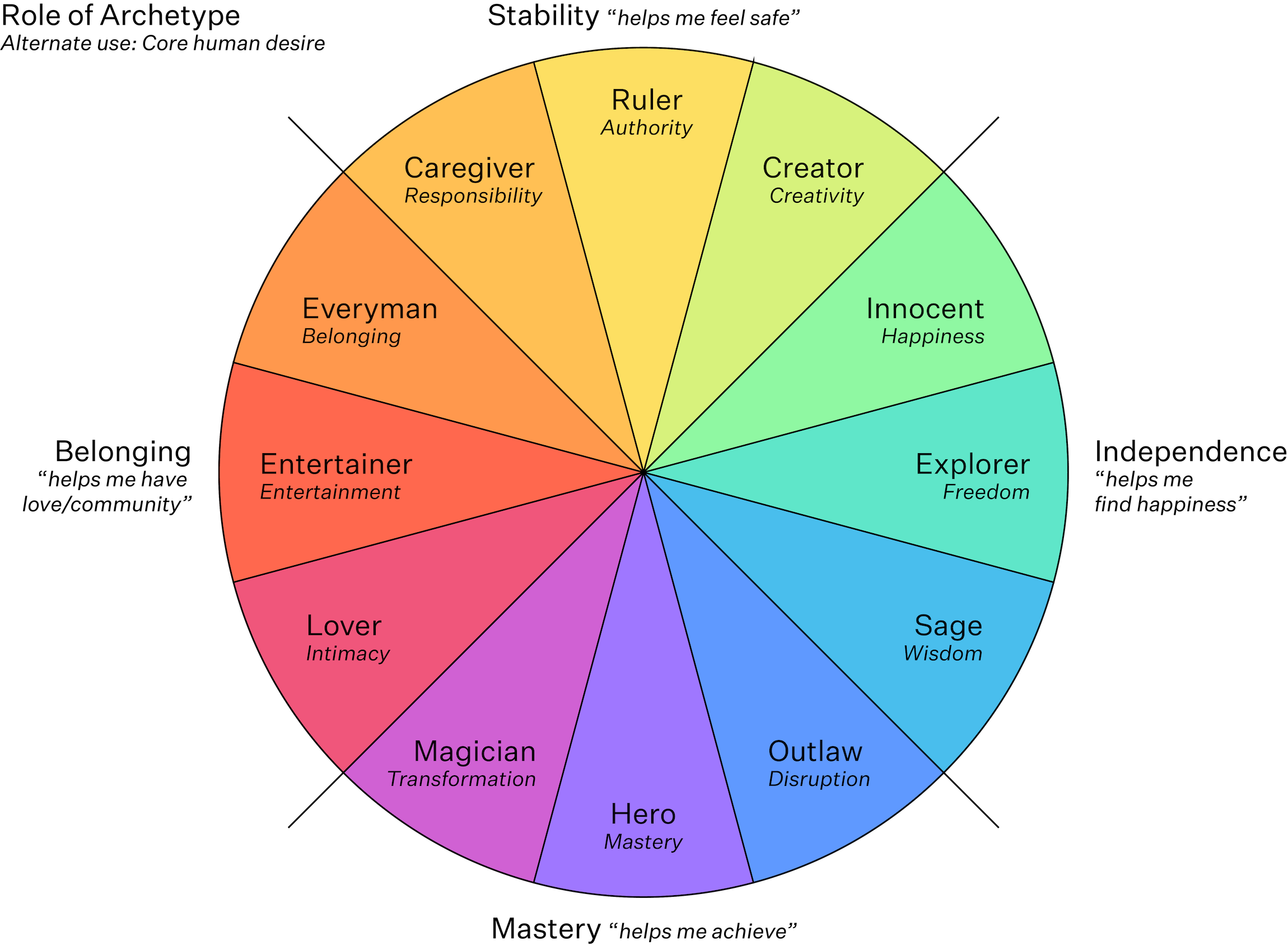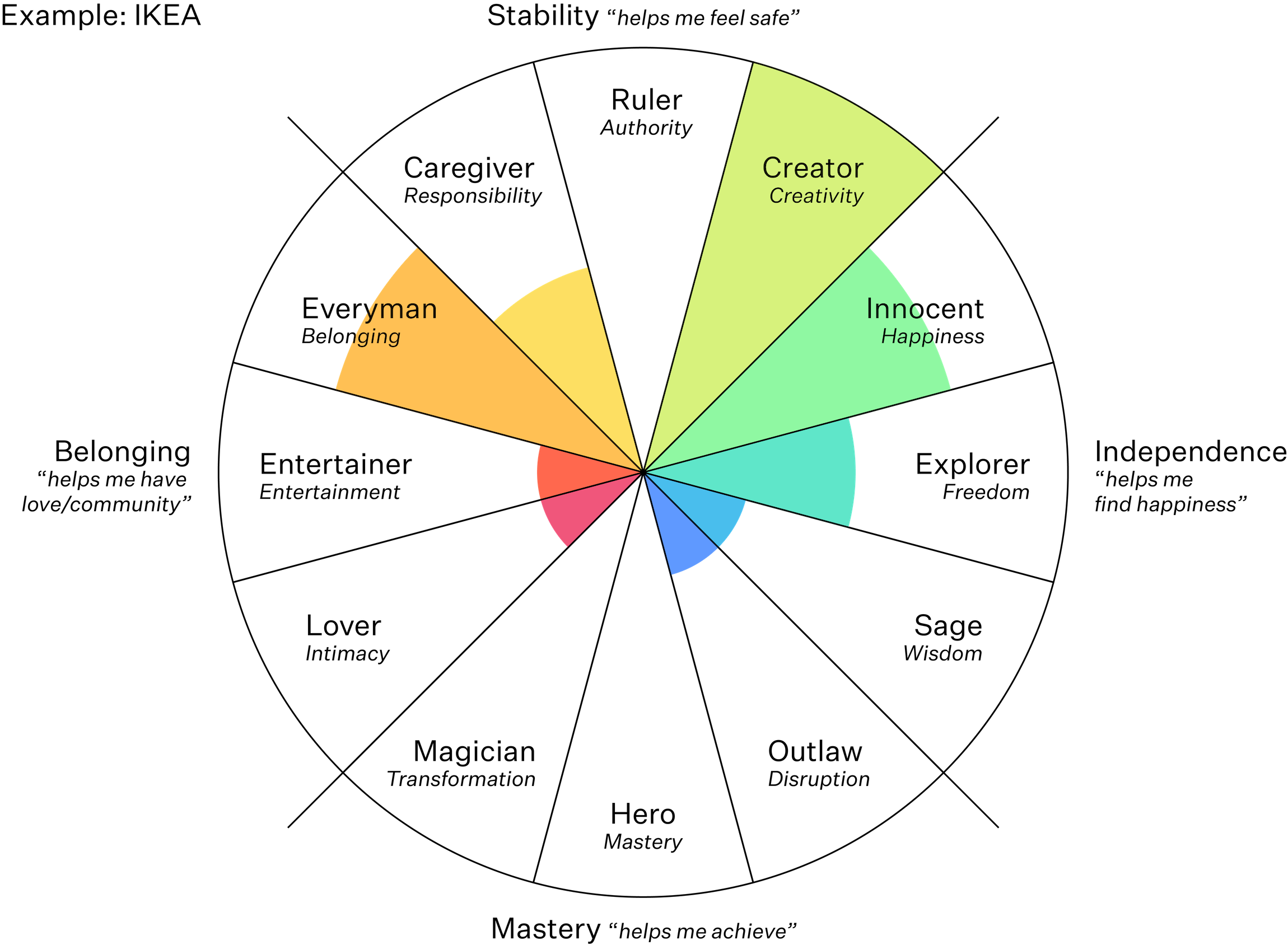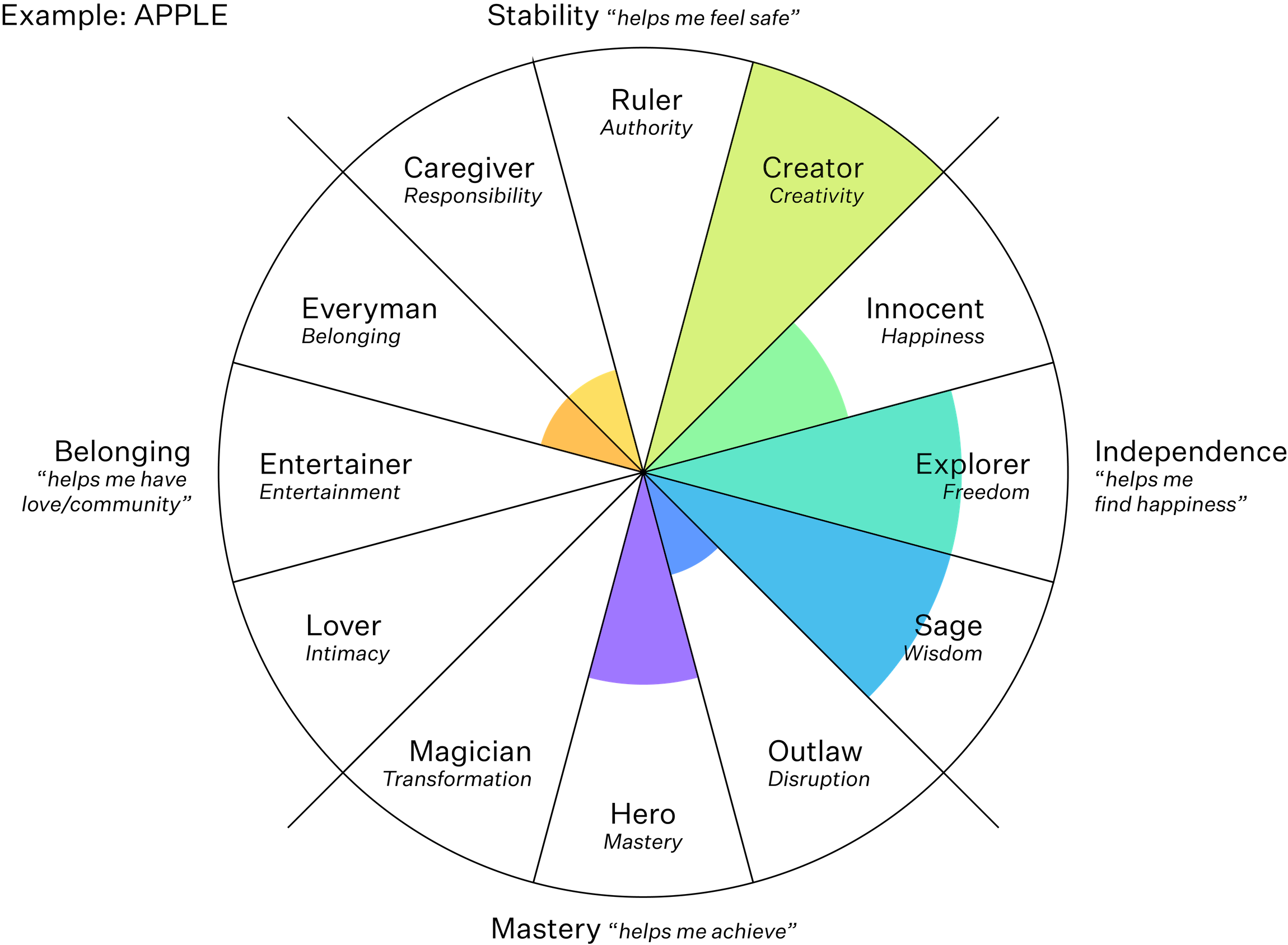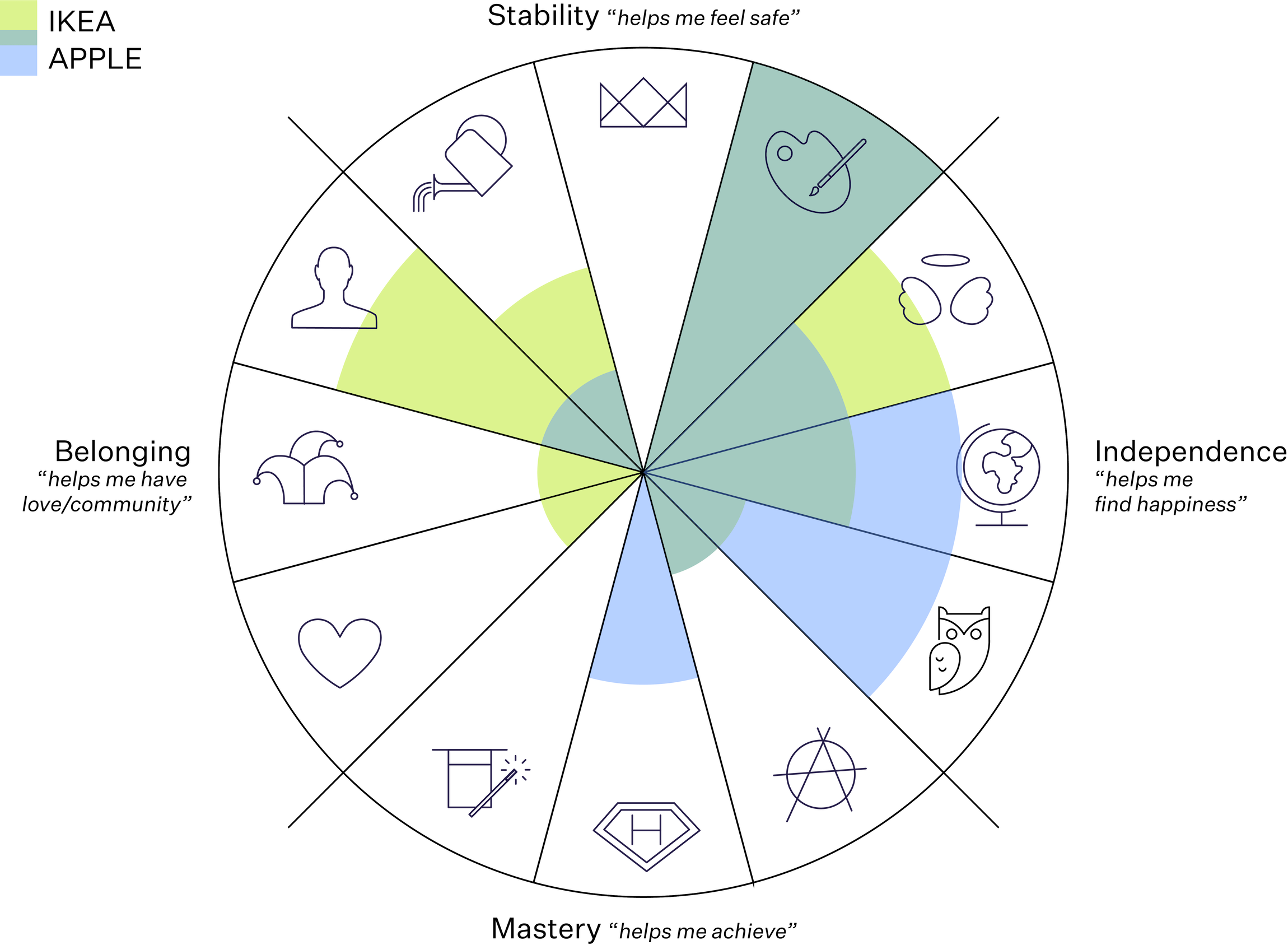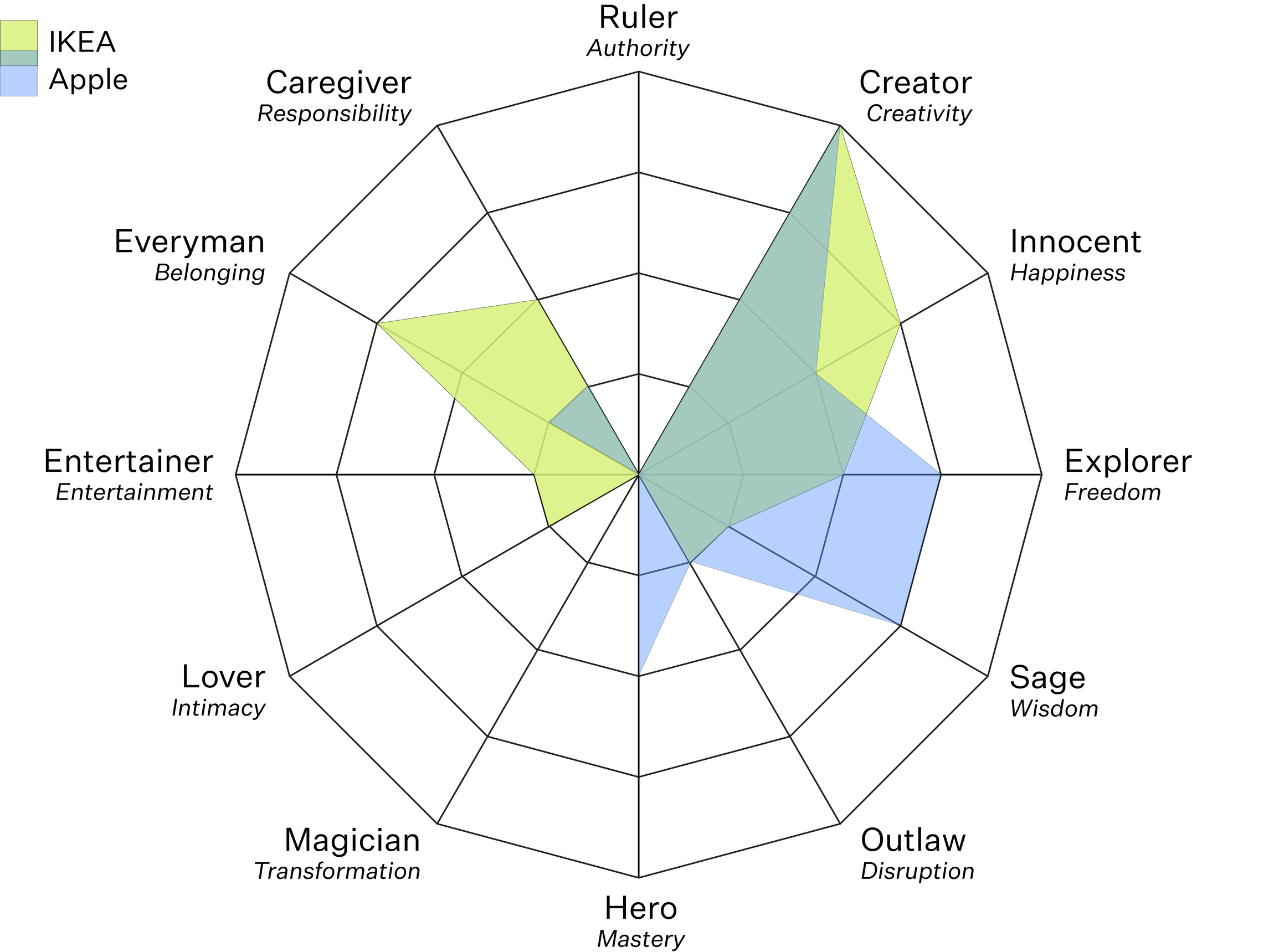Powerful Metaphors
Toobox – Brand Archetypes
In a sea of sameness—how can you drive differentiation? What you do, how you do it and why it matters is a function of the role you play in your industry. Brand archetypes are powerful metaphors that help to ascribe a role and thereby a personality to your brand. Often, in categories/industries where lines of differentiation are blurred, brand archetypes help to draw out the differences.
Brand Archetypes (also know as Brand Character) help define a brand’s role in the marketplace—in the lives of customers—by connecting at a deeply human level, with stories that cross cultures and connect at an unconscious level. Archetypes help create a consistent and compelling identity, with a motivation that is recognizable, meaningful and rich enough to allow for the evolution of a brand’s story.
In defining the role your brand plays through archetypes, it allows us to elevate key attributes that help inspire a brand proposition, and clarify brand personality. Completed together with key clients, it helps us understand our clients’ view on the role they play, and how this role impacts our strategic foundation.
A bit of history
The Swiss Psychologist Carl Jung (1865-1961) believed that humans tend to use symbolism to understand their world. He introduced the concept that our unconscious actions and thoughts are heavily influenced by age-old stories. This is why some characters are so instantly recognizable to us, proving the theory that they are a part of our shared collective unconscious. After Jung, the eminent mythologist Joseph Campbell began to explore how archetypes explain mankind’s hunt for meaning in the world through art, pop culture, mythology, literature, and beyond. This is exactly how the idea of archetyping was brought into the modern world. Unsurprisingly, we have become accustomed to such archetypes being represented as film or book characters. Fairy Godmother, for instance, is an epitome of a motherly figure and caregiver while Ethan Hunt is a classic hero.
The most successful brands are those that most effectively correspond to fundamental patterns in the unconscious mind known as archetypes.
The premise of archetypes is based on universal, mythic characters that reside within the collective unconscious of people the world over. There are 12 basic archetypes that represent fundamental human desires and evoke deep emotions, each symbolising a basic human need, aspiration or motivation. Each has its own set of values, meanings and personality traits. These archetypes are found everywhere: literature, cinema and television, theatre, music, mythology, religion, political and celebrity personas—and in marketing and advertising. They are commonly used by advertising companies and consumer products companies (e.g., P&G). The majority of approaches in the marketplace today are based heavily on Carol S Pearson’s work on archetypes, and their use in marketing (The Hero and the Outlaw, 2001), that build on Carl Jung’s theory.
A fresh point of view
Recently, the view that one personality is not sufficient to illuminate all facets has become more and more accepted. Especially with similar core characteristics, it can be important to include other characteristics as blend. See also the example of IKEA and APPLE, both positioned as Creators. Please make sure that there is only one core archetype dimension for leading and others only blend in.
Values by KANTAR (formaly Added Value),published in BUSINESS INSIDER by Kim Bhasin, 2012.
This diagram shows the differences side by side.
The comparison superimposed
The comparison as a spider diagram
Archetypes provide:
- Guidelines for the role of the brand in the market
- Model for how a brand should act and behave
- A lens through which to assess communications and behaviors
- Human identity for the brand
The benefits:
- Projective identification, where you instill a desired perception in target audiences
- Compelling connection with key audiences
- Differentiation from competitors based on how you act, not what you do
- A strong story, helping you to tie all elements of your brand together
The Ruler |
The Creator |
The Innocent |
The Explorer |
The Sage |
The Outlaw |
The Hero |
The Magician |
The Lover |
The Entertainer |
The Everyman |
The Caregiver |
The Ruler
Motto: “Power isn’t everything. It’s the only thing.”
AKA (Also Known As): Leader, Aristocrat, Politician, Role Model, Boss
The Ruler
Motto: “Power isn’t everything. It’s the only thing.”
AKA (Also Known As): Leader, Aristocrat, Politician, Role Model, Boss
The Creator
Motto: “If it can be imagined, it can be created”
AKA: Inventor, Artist, Innovator, Musician, Writer, Dreamer and Doer
The Innocent
Motto: “Life’s simple pleasures”
AKA: Romantic, Dreamer, Utopian, Saint, Traditionalist
The Innocent
Motto: “Life’s simple pleasures”
AKA: Romantic, Dreamer, Utopian, Saint, Traditionalist
The Explorer
Motto: “Don’t fence me in”
AKA: Seeker, Adventurer, Individualist, Wanderer, Iconoclast
The Sage
Motto: “The truth will set you free”
AKA: Expert, Scholar, Advisor, Philosopher, Teacher, Planner, Mentor
The Sage
Motto: “The truth will set you free”
AKA: Expert, Scholar, Advisor, Philosopher, Teacher, Planner, Mentor
The Hero
Motto: “Where there’s a will, there’s a way”
AKA: Champion, Warrior, Crusader, Superhero, Soldier, Athlete, Competitor
The Magician
Motto: “It can happen!”
AKA(Also Known As): Visionary, Catalyst, Innovator, Medicine Man/Woman, Mediator
The Magician
Motto: “It can happen!”
AKA(Also Known As): Visionary, Catalyst, Innovator, Medicine Man/Woman, Mediator
The Outlaw
Motto: “Rules are meant to be broken”
AKA: Rebel, Revolutionary, Wild Man/Woman, Misfit, Liberator, Maverick
The Entertainer
Motto: “If I can’t dance, I don’t want to be in your revolution”
AKA: Jester Performer, Trickster, Clown, Comedian, Joker
The Entertainer
Motto: “If I can’t dance, I don’t want to be in your revolution”
AKA: Jester, Performer, Trickster, Clown, Comedian, Joker
The Lover
Motto: “I only have eyes for you”
AKA: Sensualist, Hedonist, Enthusiast, Matchmaker, Connoisseur
The Everyman
Motto: “We are all created equal”
AKA: Regular Guy/Gal, Guy/Gal next door, Realist, Citizen, Neighbor
Helps others believe that all people have value, regardless of abilities or circumstances, and that good things belong to everyone. Street smart, realistic and empathic; wants to belong in a chosen environment.
You might be The Everyman if your brand:
- Helps people belong or feel that they belong, and matter just as they are
- Something used commonly, in every day life
- Wants to differentiate in a positive way, put off by elitism
- Offers a point of connection
Desire: Connection with others
Goal: To belong, fit in
Approach: Develop ordinary, solid virtues, the common touch, celebrate what we share
Gift: Realism, empathy, lack of pretense
Sample personality attributes: Friendly, practical, grounded, outgoing, savvy, realistic, frank, egalitarian, connected
Brand example: Zappos, facebook, Dunkin’ Donuts, Cheerios, Gap, Miller, Walmart
The Everyman
Motto: “We are all created equal”
AKA: Regular Guy/Gal, Guy/Gal next door, Realist, Citizen, Neighbor
Helps others believe that all people have value, regardless of abilities or circumstances, and that good things belong to everyone. Street smart, realistic and empathic; wants to belong in a chosen environment.
You might be The Everyman if your brand:
- Helps people belong or feel that they belong, and matter just as they are
- Something used commonly, in every day life
- Wants to differentiate in a positive way, put off by elitism
- Offers a point of connection
Desire: Connection with others
Goal: To belong, fit in
Approach: Develop ordinary, solid virtues, the common touch, celebrate what we share
Gift: Realism, empathy, lack of pretense
Sample personality attributes: Friendly, practical, grounded, outgoing, savvy, realistic, frank, egalitarian, connected
Brand example: Zappos, facebook, Dunkin’ Donuts, Cheerios, Gap, Miller, Walmart
The Caregiver
Motto: “Love your neighbor as yourself”
AKA: Caretaker, Altruist, Saint, Parent, Nurturer, Helper
Supportive enabler, builds structures to nurture a better life. Helps others to achieve their goals; has an altruistic concern for and desire to help the entire world.
You might be The Caregiver if your brand:
- Provides customer service as competitive advantage, acts as partner
- Provides support for families or is associated with nurturing
- Helps people stay connected with and care about one another
- Helps people care for themselves
Desire: Protect people from harm
Goal: To help others
Approach: Do things for others
Gift: Compassion, generosity
Sample personality attributes: Nurturing, reliable, supportive, impartial, committed, trustworthy, honorable, thoughtful, giving
Brand examples: GE, Volvo, Johnson & Johnson, Subaru
© 2020 H E Y ! B R A N D


